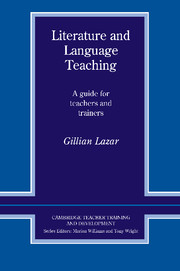Book contents
- Frontmatter
- Contents
- Thanks
- Acknowledgements
- Introduction
- 1 Using literature in the language classroom: The issues
- 2 Approaches to using literature with the language learner
- 3 Selecting and evaluating materials
- 4 Reading literature cross-culturally
- 5 Materials design and lesson planning: Novels and short stories
- 6 Materials design and lesson planning: Poetry
- 7 Materials design and lesson planning: Plays
- 8 Reflecting on the literature lesson
- 9 Literature and self-access
- Answer key
- Trainer's notes
- Bibliography
- Appendix: Eveline by James Joyce
- Index
8 - Reflecting on the literature lesson
Published online by Cambridge University Press: 04 May 2010
- Frontmatter
- Contents
- Thanks
- Acknowledgements
- Introduction
- 1 Using literature in the language classroom: The issues
- 2 Approaches to using literature with the language learner
- 3 Selecting and evaluating materials
- 4 Reading literature cross-culturally
- 5 Materials design and lesson planning: Novels and short stories
- 6 Materials design and lesson planning: Poetry
- 7 Materials design and lesson planning: Plays
- 8 Reflecting on the literature lesson
- 9 Literature and self-access
- Answer key
- Trainer's notes
- Bibliography
- Appendix: Eveline by James Joyce
- Index
Summary
In this book so far, we have looked at some of the issues underlying the use of literature in the language classroom, possible approaches towards using literature, and a range of tasks and activities. In this chapter we turn our attention to the actual teaching of the lesson and ways of reflecting on this process. This reflection should then help you to change or modify what you do, when necessary. The chapter also discusses the value of classroom observation – whether you are observing an experienced teacher on video, you are being observed yourself, or you are ‘sitting in’ on the lesson of a colleague or friend.
Thinking about observation
At some stage in their professional careers, most teachers will have observed or been observed teaching a lesson. The following questionnaire helps you to focus on your own experiences.
Personal experience
Please identify the statements which apply to you.
REASONS I HAVE OBSERVED ANOTHER TEACHER IN MY CAREER
To assess the progress of the teacher (in my capacity as director of studies, senior teacher, etc.).
To write a report on which that teacher's promotion will depend.
To watch one particular language student in the class.
To gain new insights which will help me to improve my own teaching skills.
To learn more about classroom interaction.
To learn about a class I was going to take over.
To help the teacher as part of a training course.
To learn a new activity or technique.
To check the physical factors in the room (e.g. acoustics).
- Type
- Chapter
- Information
- Literature and Language TeachingA Guide for Teachers and Trainers, pp. 167 - 178Publisher: Cambridge University PressPrint publication year: 1993

